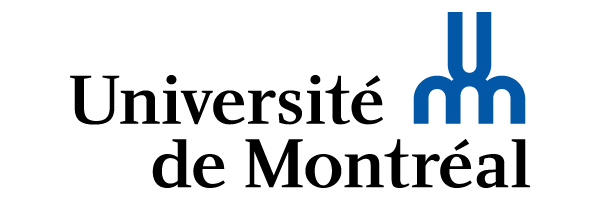Message from the Director

It is with great satisfaction that I present to you, for the first time, GREZOSP’s annual activity report. We hope its new presentation will make it accessible to a more varied audience. As GREZOSP celebrated its 20th anniversary, we experienced a very special year. The entire year was marked by a global pandemic, raising public awareness of zoonotic diseases, public health and the importance of a One Health approach to deal with complex situations as well as preventing future ones.
The year 2020 was also the year of a change in leadership for our research group. I officially took office in October, succeeding Dr. André Ravel, whom I thank for all the work accomplished in the development of our strategic plan, the revision of the group’s statutes, not to mention the promotion of research on zoonotic disease epidemiology and public health by our members.
Having worked in many different contexts, I can appreciate and emphasize my chance to lead a network of committed and motivated people from diverse organizations and convinced of the added value of the collaborative spirit present in GREZOSP since its beginning. This is a wealth to be appreciated and maintained.
My meetings with our partners have confirmed that our primary competence to be highlighted is the epidemiology of infectious diseases for which a One Health approach presents an added value (it is sometimes still to be demonstrated!), including of course zoonoses, but also animal and human infectious agents having impacts on other species. This is the core of our activities, which we enrich with complementary disciplines. I intend to continue to build on our core competency while enhancing it with other disciplines by giving us a new momentum.
The COVID-19 pandemic has raised global awareness of the importance of preventing animal-borne infections and the One Health approach. Is this enough to change our behaviors and systems to prevent a future pandemic? Probably not. In order to maximize the reach and impact of our rigorous, multidisciplinary work, it is imperative that we take the opportunity to educate and train new generations of professionals and researchers not only in epidemiology, but also in a multi-system One Health approach. Our last strategic plan already included this component, and I believe it is even more important now!
The arrival of a new colleague dedicated to the local and international outreach of GREZOSP demonstrates our desire to make ourselves known, to enrich societal debates and to orient decision-makers through a greater dissemination of our research results. Dr. Caroline Kilsdonk has recently joined our team in this role.
The outreach of an organization like ours requires teamwork. Every effort counts. We, the members (researchers, professionals, students), partners and collaborators, participate in the prevention, protection and improvement of human, public and animal health. Let’s also join our efforts to express ourselves, to enlighten societal debates, to promote reflection and to inform decision makers.
Enjoy your reading!
Hélène Carabin, Director
GREZOSP : A Few Figures
exceptional research group
located in the only francophone faculty of veterinary medicine in the North American continent
veterinary public health pavilion where professionals from two federal agencies and the Faculty of Veterinary Medicine (FVM) collaborate
members
representing some 15 institutions
and organizations
In the Field: Spotlight on GREZOSP-Supported Student Research Projects
Ève-Marie Lavallée-Bourget, Master’s student under the supervision of Julie Arsenault: “Echinococcosis – Study on the geographical distribution of the parasite in peri-urban areas in Quebec”.
Alveolar echinococcosis (AE) is a parasitic zoonosis caused by a flatworm, Echinococcus multilocularis (EM). Although it measures only a few millimetres, the presence of this parasite is a concern for the health of animals and humans. While Quebec was considered spared, a first human case that would have been acquired in Quebec territory was diagnosed in 2018, testifying to the evolution of the geographical distribution of the parasite.
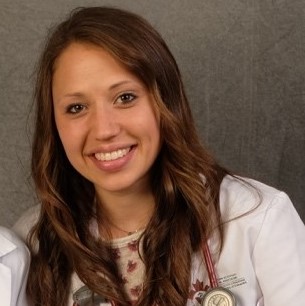
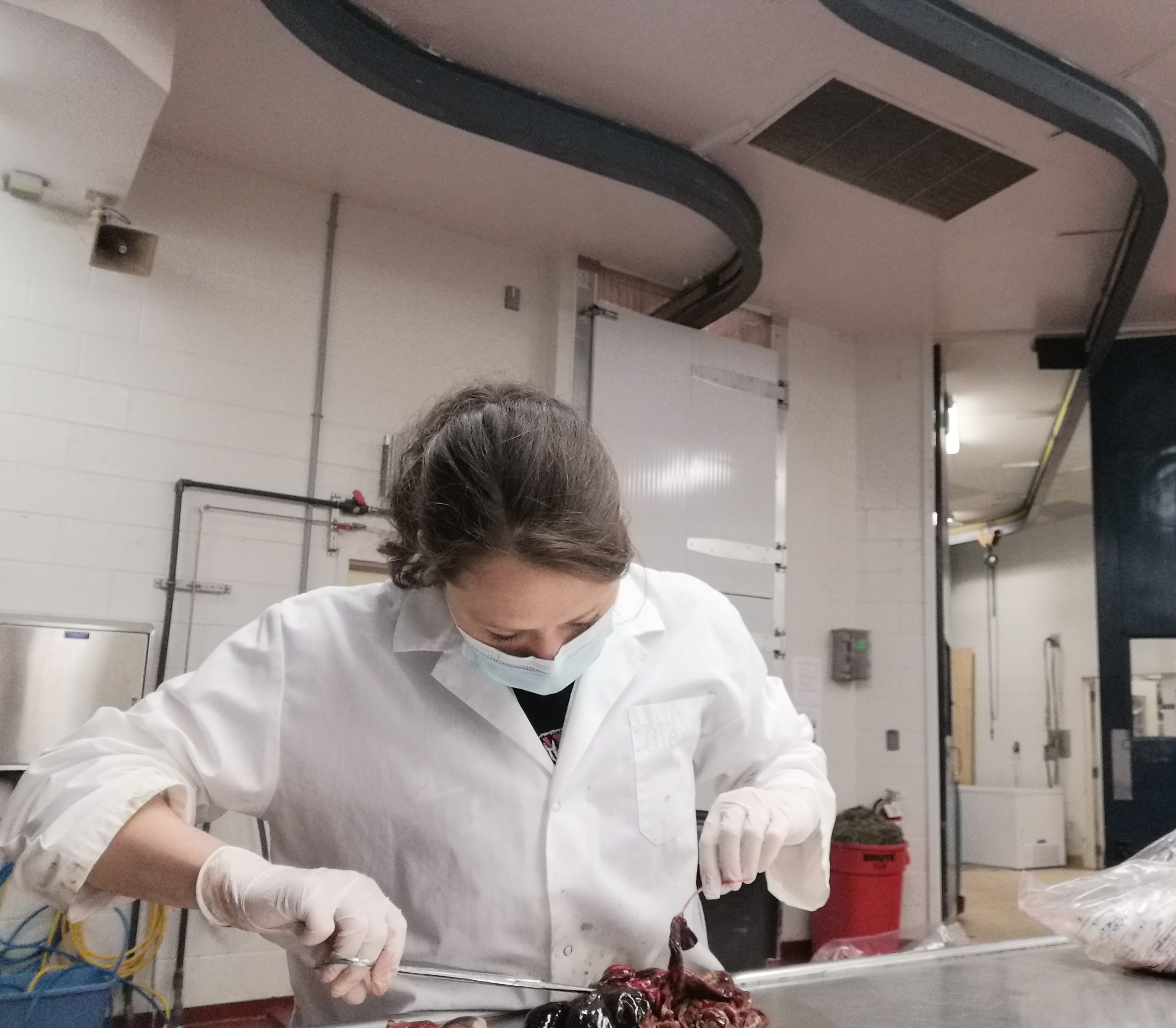
In Quebec, the coyote (Canis latrans) and the red fox (Vulpes vulpes) are the main definitive hosts and excrete the eggs in their feces. Man is an accidental host. He is infected by ingesting eggs found in the environment and it is therefore in the latter that the disease can develop and cause severe clinical signs. The dog can be both a definitive or accidental host, presenting a risk to its owner. It is an insidious disease, as clinical signs in humans usually appear 5 to 15 years after infection and the prognosis is guarded when no treatment is undertaken. A cancerous-looking lesion forms, most often in the liver.
In order to draw up a portrait of the situation in Quebec, and in collaboration with trappers from 12 administrative regions, we harvested 750 fox and coyote carcasses in the fall of 2020 and winter of 2021. Viscera were initially examined for heartworms and lung parasites, and then feces were collected to identify the major parasitic species present in wild canids and to perform a PCR test for Echinococcus identification.
The data collected will be mapped and will allow us to define the prevalence and spatial distribution of EM in Quebec and to identify areas particularly at risk. They will also allow us to alert people at risk to this condition and to better protect human and animal populations. Surveillance and prevention are both key elements that must be put in place to manage this condition.

Mohammad Jalal, Ph.D. student under the supervision of Hélène Carabin : «Improving the diagnosis and burden estimation of neurocysticercosis.»
Neurocysticercosis (NCC) is a zoonotic helminthic infection of the central nervous system caused by the larvae of Taenia solium, a tapeworm that can infect both pigs and humans. Humans can become infected with NCC after consuming of undercooked pork that contain encysted larvae of T. solium, contaminated water with helminthic eggs; or due to autoinfection, a consequence of poor hygiene practice. The common symptoms of NCC are epilepsy/seizures and headache. To date, most effective diagnostic tool for the diagnosis of NCC is CT and MRI, which require expert interpreter and expensive establishment. Although NCC is reported in several countries of Africa, Asia and America, the worldwide frequency of this disease, transmission dynamics, and cost-effective control strategy is yet to be assessed and described.
In this project, we will try – (1) To develop an exosome-based diagnostic approach for neurocysticercosis using stored sera collected in a study conducted in Burkina Faso between 2012 and 2015; (2) To conduct a systematic review of the literature, including meta-analyses and meta-regression, on the frequency of symptoms due to NCC to update a review done more than 10 years ago; (3) To use the results of (1) and (2) and to modify a compartmental transmission dynamics model develop by Dr. Carabin’s team to include NCC and estimate the cost-benefit and cost-effectiveness of alternative prevention and treatment strategies.
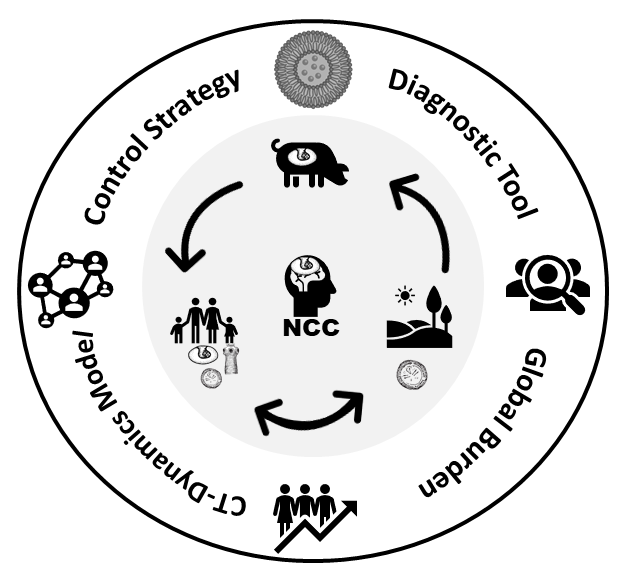
GREZOSP’s Work Related to the COVID-19 Pandemic and Other Zoonoses
GREZOSP members closely involved in the response to COVID-19
In addition to the extensive involvement of researchers from the Public Health Agency of Canada in modeling the transmission of the virus and the daily mapping of cases in Canada, and in the development of policies and information for the response, many members and students have been working on prevention measures for essential workers, case tracing, science outreach, and vaccination, among other things, in addition to several research projects.
Launch of the study on the risk of COVID-19 infection in cats
Dr. Cécile Aenishaenslin‘s team launched a study in January 2021 to assess the risk of SARS-CoV-2 infection in cats residing in households where at least one person is infected.
This is an exploratory study: by analyzing the risk of transmission in a small number of cats, it will assess whether it is appropriate to launch a large-scale study.
This study has two main objectives: to determine the frequency of infection in cats exposed to an infected human and to identify risk factors for cats.
Since then, the research team, which also includes Dr. Hélène Carabin and Dr. Julie Arsenault, has diagnosed the first case of COVID-19 in a cat in Quebec.
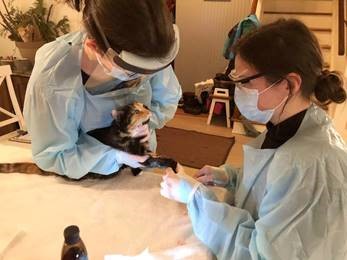
Partnership with the Institut national de santé publique du Québec
A collaboration agreement between the Institut national de santé publique du Québec (INSPQ) and the Faculty of Veterinary Medicine through GREZOSP has ensured the joint development and coordination of the Observatoire multipartite québécois sur les zoonoses et l’adaptation aux changements climatiques (Observatory). The mission of this Observatory is to anticipate zoonotic problems in Quebec in order to support risk management and better adapt to climate change.
Audrey Simon (GREZOSP) and Danaelle Page (INSPQ) co-coordinated the Observatory until October 31, 2020, when the funding of the INSPQ-GREZOSP agreement ended, which also marked the end of the Government of Quebec’s Action Plan on Climate Change.
During the period between April and October 2020, Audrey Simon co-led the development and implementation of a project to prioritize issues to anticipate the emergence of zoonotic diseases in the context of climate change adaptation in Quebec. A report will be released shortly to present this large-scale work that mobilized the members of the Observatory as well as several dozen experts around a tool for prioritizing issues using the DELPHI method.
On October 28, the Observatory participated in a session of the Ouranos Symposium: Quand les CC dérèglent la nature… La santé, l’économie et les écosystèmes sont en péril. Audrey Simon gave a presentation entitled: L’Observatoire multipartite québécois sur les zoonoses et l’adaptation aux changements climatiques – Impacts des changements climatiques sur les zoonoses, vulnérabilités et capacités d’adaptation du Québec.
"Science Infuse" Podcast Series
“Science Infuse: a GREZOSP podcast” is a research promotion media, created on the occasion of the twentieth anniversary of the group. Presented by four student researchers, Léa Delesalle, Valérie Hongoh, Hélène Lardé and Carol-Anne Villeneuve, it offers you to discover in a few minutes the main themes of One Health research, at the interface between animal and public health.
Since its inception, the podcast team has produced three episodes, one covering the topic of antibiotic resistance in dairy farms and two episodes addressing the COVID-19 pandemic from the perspective of One Health. To make sure you don’t miss any upcoming episodes, follow our podcast on the GREZOSP website and on social networks, including our Facebook page, SoundCloud and Spotify!

GREZOSP Awards and Scholarships
GREZOSP has a strong commitment to supporting its graduate students. Since its creation in 2015, the GREZOSP Scholarship Program has distributed more than $120,000 to its students for their recruitment and support at the end of their studies, as well as to allow them to present their results at international conferences, including the International Symposium of Veterinary Epidemiology and Economics. Many of these graduates are now working in Quebec as professionals in organizations such as PHAC, CFIA and INSPQ, as well as in France and Niger.
The winners of the 2020-2021 GREZOSP scholarships are Ève-Marie Lavallée-Bourget, a master’s student under the supervision of Julie Arsenault, and Mohammad Jalal, a doctoral student under the supervision of Hélène Carabin.
The Lucie-Dutil Award, given to a GREZOSP student member in recognition of his or her outstanding contribution to the life of the group through human qualities, was presented to Nikky Millar, a master’s student under the direction of Cécile Aenishaenslin, for the 2019-2020 academic year.
In addition, GREZOSP student members are eligible for two public health awards and scholarships awarded by the Faculty of Veterinary Medicine at the 2020-2021 Annual Awards Ceremony that took place on April 15, 2021. The Victor-Théodule Daubigny Prize was awarded to Charlotte Nury, a DMV student (3rd year) and the Caisse Desjardins de la région de Saint-Hyacinthe Bursary was awarded to Antoine Levasseur, a master’s student.
Our Researchers in the Media
In the past year, the media have called upon our researchers many times, including Levon Abrahamyan, Cécile Aenishaenslin, Hélène Carabin, Simon Dufour, Hélène Lardé and Carol-Anne Villeneuve, to comment on subjects ranging from Lyme disease to the COVID-19 pandemic. They have appeared on several occasions in La Presse, Le Devoir, The Gazette, La Voix de l’Est, Québec Sciences, the Bulletin des agriculteurs and La Terre de chez nous. They have also been heard on Radio-Canada, TVA, CTV and Global News.
Follow Us on Social Media!
Management Team
Board of Directors
President
Jean-Pierre Lavoie
Vice-dean of Research, FVM
Members
Michel Bigras-Poulin
Retired FVM professor
Hélène Carabin
Director of GREZOSP and full professor at FVM
Julie Paré
Epidemiologist, Science Branch, Canadian Food Inspection Agency and FVM associate professor
Nicholas H. Ogden
Director, Public Health Risk Science Division, National Microbiology Laboratory @ St-Hyacinthe/Guelph, Public Health Agency of Canada
Jean-Philippe Rocheleau
Professor / Head of Departmental Coordination, Department of Animal Health, Cégep de Saint-Hyacinthe and associate professor at FVM
Scientific Committee
Hélène Carabin
Director of GREZOSP and full professor at FVM
Farouk El Allaki
Epidemiologist and Science Advisor, Canadian Food Inspection Agency
Antoinette Ludwig
Veterinary epidemiologist, Public Health Agency of Canada and associate professor at FVM
Jérôme Pelletier
PhD student in epidemiology at FVM
Mohamed Rhouma
Assistant professor at FVM
Patricia Turgeon
Section Head and Epidemiologist, Public Health Agency of Canada and associate professor at FVM
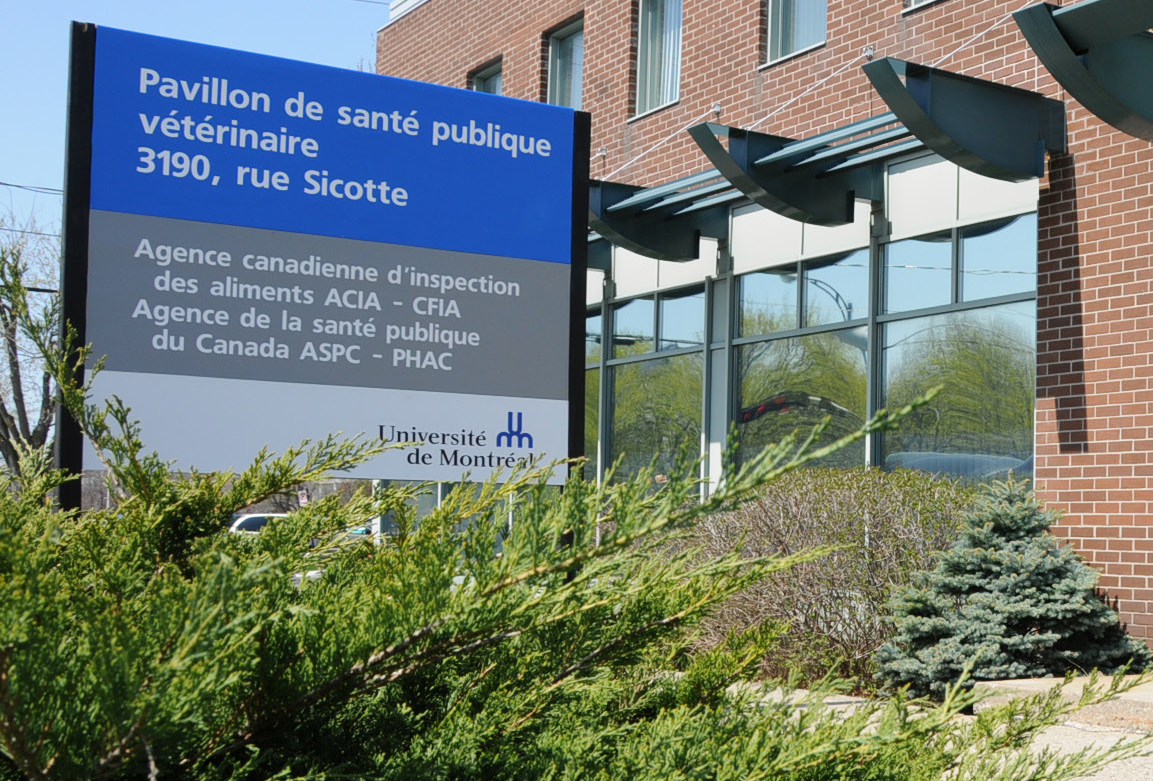
Publications
Our researchers have published numerous articles under the GREZOSP affiliation in 2020-2021:
Cherifi T, Arsenault J, Pagotto F, Quessy S, Côté JC, Neira K, Fournaise S,Bekal S, Fravalo P. Distribution, diversity and persistence of Listeria monocytogenes in swine slaughterhouses and their association with food and human listeriosis strains. PLoS One. 2020 Aug 6;15(8):e0236807. doi: 10.1371/journal.pone.0236807. PMID: 32760141; PMCID: PMC7410256.
Taieb L, Ludwig A, Ogden NH, Lindsay RL, Iranpour M, Gagnon CA, Bicout DJ. Bird Species Involved in West Nile Virus Epidemiological Cycle in Southern Québec. Int J Environ Res Public Health. 2020 Jun 23;17(12):4517. doi:10.3390/ijerph17124517. PMID: 32585999; PMCID: PMC7344584.
Turcotte MÈ, Denis-Robichaud J, Dubuc J, Harel J, Tremblay D, Gagnon CA, Arsenault J. Prevalence of shedding and antibody to Coxiella burnetii in post-partum dairy cows and its association with reproductive tract diseases and performance: A pilot study. Prev Vet Med. 2021 Jan;186:105231. doi:10.1016/j.prevetmed.2020.105231. Epub 2020 Dec 10. PMID: 33360180.
Lardé H, Dufour S, Archambault M, Massé J, Roy JP, Francoz D. An observational cohort study on antimicrobial usage on dairy farms in Quebec, Canada. J Dairy Sci. 2021 Feb;104(2):1864-1880. doi: 10.3168/jds.2020-18848. Epub 2020 Nov 30. PMID: 33272584.
Ogden NH, Ben Beard C, Ginsberg HS, Tsao JI. Possible Effects of Climate Change on Ixodid Ticks and the Pathogens They Transmit: Predictions and Observations. J Med Entomol. 2020 Oct 28:tjaa220. doi: 10.1093/jme/tjaa220. Epub ahead of print. PMID: 33112403.
de Lagarde M, Vanier G, Desmarais G, Kohan-Ghadr HR, Arsenault J, Fairbrother JM. A new multidrug-resistant enterotoxigenic Escherichia coli pulsed-field gel electrophoresis cluster associated with enrofloxacin non-susceptibility in diseased pigs. J Appl Microbiol. 2021 Mar;130(3):707-721. doi:10.1111/jam.14816. Epub 2020 Aug 25. PMID: 32767832; PMCID: PMC7984379.
Valois P, Bouchard D, Aenishaenslin C, Talbot D, Bouchard C, Briand S, Tessier M. Development and validation of a behavioral index for adaptation to lyme disease. BMC Public Health. 2020 Sep 21;20(1):1435. doi: 10.1186/s12889-020-09535-2. PMID: 32958077; PMCID: PMC7507261.
Guillot C, Badcock J, Clow K, Cram J, Dergousoff S, Dibernardo A, Evason M, Fraser E, Galanis E, Gasmi S, German GJ, Howse DT, Jardine C, Jenkins E, Koffi J, Kulkarni M, Lindsay LR, Lumsden G, McKay R, Moore K, Morshed M, Munn D, Nelder M, Nocera J, Ripoche M, Rochon K, Russell C, Slatculescu A, Talbot B, Thivierge K, Voordouw M, Bouchard C, Leighton P. Sentinel surveillance of Lyme disease risk in Canada, 2019: Results from the first year of the Canadian Lyme Sentinel Network (CaLSeN). Can Commun Dis Rep. 2020 Oct 1;46(10):354-361. doi: 10.14745/ccdr.v46i10a08. PMID: 33315999; PMCID: PMC7723316.
Cyr J, Turcotte MÈ, Desrosiers A, Bélanger D, Harel J, Tremblay D, Leboeuf A, Gagnon CA, Côté JC, Arsenault J. Prevalence of Coxiella burnetii seropositivity and shedding in farm, pet and feral cats and associated risk factors in farm cats in Quebec, Canada. Epidemiol Infect. 2021 Feb 15;149:e57.doi: 10.1017/S0950268821000364. PMID: 33583452.
Adam-Poupart A, Drapeau LM, Bekal S, Germain G, Irace-Cima A, Sassine MP, Simon A, Soto J, Thivierge K, Tissot F. Occupations at risk of contracting zoonoses of public health significance in Québec. Can Commun Dis Rep. 2021 Jan 29;47(1):47-58. doi: 10.14745/ccdr.v47i01a08. PMID: 33679248; PMCID: PMC7919776.
Abraham A, Bustos JA, Carabin H, de Meijere R, Sahu PS, Rajshekhar V, Singh G, White AC Jr, Chiodini PL, Gabriël S, Homeida M, Nash T, Ngowi B, Zhou XN, Coyle C, Garcia HH, Winkler AS. The effectiveness of anti-inflammatory and anti-seizure medication for individuals with single enhancing lesion neurocysticercosis: A meta-analysis and expert group-based consensus recommendations. PLoS Negl Trop Dis. 2021 Mar 31;15(3):e0009193. doi:10.1371/journal.pntd.0009193. PMID: 33788843.
Sauvé CC, Rees EE, Gilbert AT, Berentsen AR, Allibert A, Leighton PA. Modeling Mongoose Rabies in the Caribbean: A Model-Guided Fieldwork Approach to Identify Research Priorities. Viruses. 2021 Feb 20;13(2):323. doi:10.3390/v13020323. PMID: 33672496; PMCID: PMC7923793.
de Lagarde M, Vanier G, Arsenault J, Fairbrother JMM. High Risk Clone: A Proposal of Criteria Adapted to the One Health Context with Application to Enterotoxigenic Escherichia coli in the Pig Population. Antibiotics (Basel). 2021 Feb 28;10(3):244. doi: 10.3390/antibiotics10030244. PMID:33671102; PMCID: PMC8000703.

